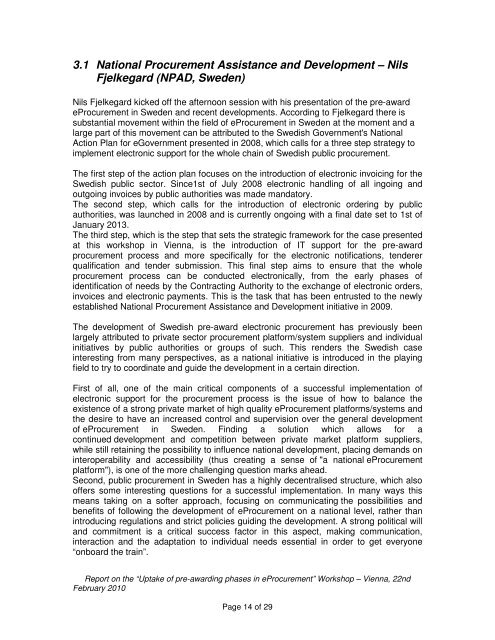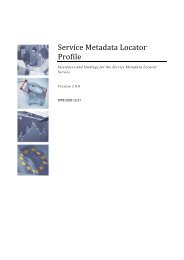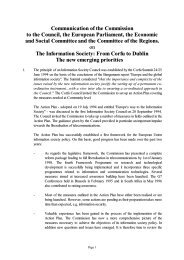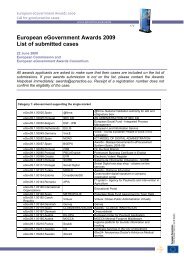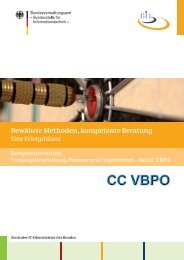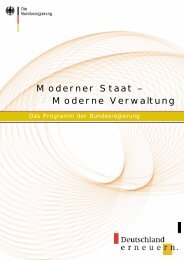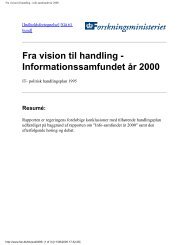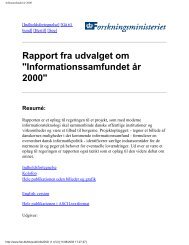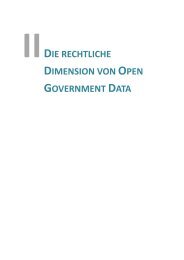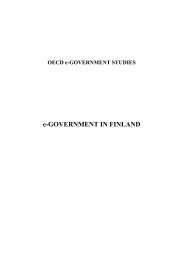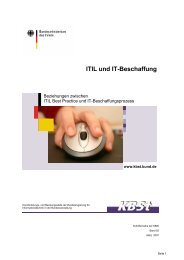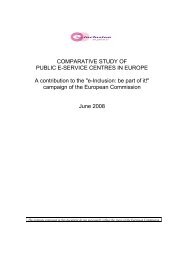eProcurement Forum Uptake of pre-awarding phases ... - ePractice.eu
eProcurement Forum Uptake of pre-awarding phases ... - ePractice.eu
eProcurement Forum Uptake of pre-awarding phases ... - ePractice.eu
You also want an ePaper? Increase the reach of your titles
YUMPU automatically turns print PDFs into web optimized ePapers that Google loves.
3.1 National Procurement Assistance and Development – Nils<br />
Fjelkegard (NPAD, Sweden)<br />
Nils Fjelkegard kicked <strong>of</strong>f the afternoon session with his <strong>pre</strong>sentation <strong>of</strong> the <strong>pre</strong>-award<br />
<strong>eProcurement</strong> in Sweden and recent developments. According to Fjelkegard there is<br />
substantial movement within the field <strong>of</strong> <strong>eProcurement</strong> in Sweden at the moment and a<br />
large part <strong>of</strong> this movement can be attributed to the Swedish Government's National<br />
Action Plan for eGovernment <strong>pre</strong>sented in 2008, which calls for a three step strategy to<br />
implement electronic support for the whole chain <strong>of</strong> Swedish public procurement.<br />
The first step <strong>of</strong> the action plan focuses on the introduction <strong>of</strong> electronic invoicing for the<br />
Swedish public sector. Since1st <strong>of</strong> July 2008 electronic handling <strong>of</strong> all ingoing and<br />
outgoing invoices by public authorities was made mandatory.<br />
The second step, which calls for the introduction <strong>of</strong> electronic ordering by public<br />
authorities, was launched in 2008 and is currently ongoing with a final date set to 1st <strong>of</strong><br />
January 2013.<br />
The third step, which is the step that sets the strategic framework for the case <strong>pre</strong>sented<br />
at this workshop in Vienna, is the introduction <strong>of</strong> IT support for the <strong>pre</strong>-award<br />
procurement process and more specifically for the electronic notifications, tenderer<br />
qualification and tender submission. This final step aims to ensure that the whole<br />
procurement process can be conducted electronically, from the early <strong>phases</strong> <strong>of</strong><br />
identification <strong>of</strong> needs by the Contracting Authority to the exchange <strong>of</strong> electronic orders,<br />
invoices and electronic payments. This is the task that has been entrusted to the newly<br />
established National Procurement Assistance and Development initiative in 2009.<br />
The development <strong>of</strong> Swedish <strong>pre</strong>-award electronic procurement has <strong>pre</strong>viously been<br />
largely attributed to private sector procurement platform/system suppliers and individual<br />
initiatives by public authorities or groups <strong>of</strong> such. This renders the Swedish case<br />
interesting from many perspectives, as a national initiative is introduced in the playing<br />
field to try to coordinate and guide the development in a certain direction.<br />
First <strong>of</strong> all, one <strong>of</strong> the main critical components <strong>of</strong> a successful implementation <strong>of</strong><br />
electronic support for the procurement process is the issue <strong>of</strong> how to balance the<br />
existence <strong>of</strong> a strong private market <strong>of</strong> high quality <strong>eProcurement</strong> platforms/systems and<br />
the desire to have an increased control and supervision over the general development<br />
<strong>of</strong> <strong>eProcurement</strong> in Sweden. Finding a solution which allows for a<br />
continued development and competition between private market platform suppliers,<br />
while still retaining the possibility to influence national development, placing demands on<br />
interoperability and accessibility (thus creating a sense <strong>of</strong> "a national <strong>eProcurement</strong><br />
platform"), is one <strong>of</strong> the more challenging question marks ahead.<br />
Second, public procurement in Sweden has a highly decentralised structure, which also<br />
<strong>of</strong>fers some interesting questions for a successful implementation. In many ways this<br />
means taking on a s<strong>of</strong>ter approach, focusing on communicating the possibilities and<br />
benefits <strong>of</strong> following the development <strong>of</strong> <strong>eProcurement</strong> on a national level, rather than<br />
introducing regulations and strict policies guiding the development. A strong political will<br />
and commitment is a critical success factor in this aspect, making communication,<br />
interaction and the adaptation to individual needs essential in order to get everyone<br />
“onboard the train”.<br />
Report on the “<strong>Uptake</strong> <strong>of</strong> <strong>pre</strong>-<strong>awarding</strong> <strong>phases</strong> in <strong>eProcurement</strong>” Workshop – Vienna, 22nd<br />
February 2010<br />
Page 14 <strong>of</strong> 29


